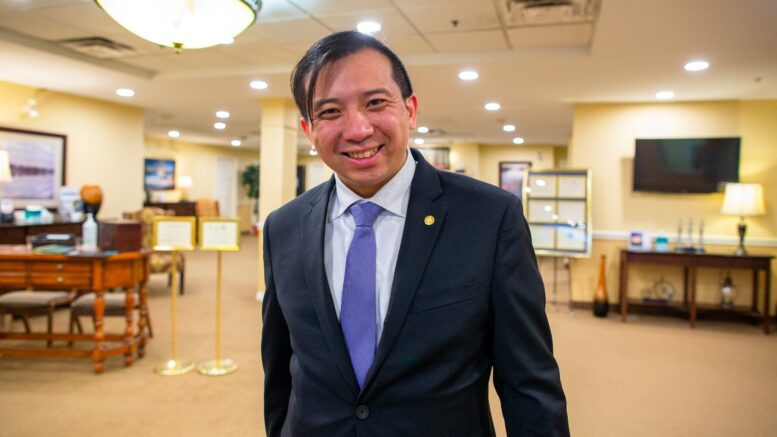Warm light filters into the hall from the arched windows, casting soft shadows upon aisles of polished wooden pews as Philip Cheng walks down the aisle of his funeral home.
Walls of muted hues of grey and beige surround the room. On the table covered by a piece of draping white cloth placed at the front of the hall were baby photos in white frames and two big hand-drawn calendars recording the daily life of a baby who had died.
The air was heavy, filled with the scent of lilies and the faint murmur of people exchanging hushed condolences.
Death, for many, is uncomfortable to talk about. While we dread the unavoidable, funeral directors such as Cheng, who works at a funeral home in Markham, encounter it in their daily work.
“Funeral directors are like wedding planners, but one celebrates two individuals blending into one, while the other grieves the loss of a loved one,” he said.
From teacher to funeral director
Cheng embarked on his journey to becoming a funeral director three years ago. Before that, he worked as a primary school teacher in Hong Kong for 20 years.
“With this fresh change, I could continue to teach, but I wanted to try something different in the second half of my life,” Cheng said.
He graduated from the Funeral Director Class 1 (Embalming) diploma program at Humber College last year and has worked at his current funeral home since.
The work of funeral directors
“Everything related to death is relevant to me,” Cheng said.
Funeral directors help clients plan out funerals. Beyond event planning and management, however, there are many more aspects to the job.
“Funeral directors would assist the family in making whatever arrangements they wish for, whatever type of funeral it might look like for that individual,” said Jeff Caldwell, a funeral director and funeral services professor at Humber College.
They are also, in most circumstances, responsible for the technical work of preparing the remains, including restorative work, embalming and burial.
On top of that, handling paperwork like death registration, co-ordinating all parties involved in a funeral, and contacting a cemetery, a crematorium, a celebrant or a religious leader are all part of a funeral director’s work.


Caldwell says there are times that funeral directors become what he calls “little-C counsellors.” They families through the initial period of grief by providing advice, assistance and a listening ear.
Students in the Humber program take a required course called “Grief.”
“Our society isn’t open to talking about hurt, and especially when it comes to death, and loss, and grief,” Caldwell said.
Our society isn’t open to talking about hurt, and especially when it comes to death, and loss, and grief.
“So what we are teaching our students is to be that sounding board, to allow people to express what they need to express, to be understanding when some of the things expressed might be something that we wouldn’t want to hear.”
Just like weddings, planning a funeral that checks all the boxes for the clients and their loved ones is important. The finest details matter to Cheng as much as they do to his clients.
“If we need to engrave a name onto the funeral urn, how we do it, and what font to use — these are some things that can be customized,” Cheng said. “There are also different ways to remember and honour, and we do our best to meet our clients’ needs.”
Motivated by passion, his Christian faith and his calling to become a funeral director, Cheng wanted to be a blessing to families going through loss and honour their loved ones through his work.
“A simple ‘thank you’ and a hug from the family after the funeral gives me a great sense of fulfillment,” said Cheng.
A simple ‘thank you’ and a hug from the family after the funeral gives me a great sense of fulfillment.
Cheng has served many families, but one particular funeral stuck with him.
Three months of life was all the baby had. He never got to go home in a stroller with his parents, but fought for his life in the hospital. After his passing, his parents got in touch with Cheng to plan their baby’s memorial service.
The funeral was scheduled shortly after the baby’s cremation.
Plan a funeral before you need to
Regardless of how you or your loved ones prefer to have the body remains handled, planning a funeral is complicated, especially in times of loss and grievance.
Michelle Clarke, a funeral director and funeral services professor at Humber College, advised families to consider the things they need in a funeral beforehand.
“I think it’s important for people to become as knowledgeable as they can about what options are available so that if and when they need to make decisions like that, they’re a little more knowledgeable,” Clarke said.
“They often are in crisis when they come to see us, and so trying to make decisions when you’re in a highly emotional state is even more challenging.”
Remembering life
It has been a couple of months since the baby died. Cheng recently got an email from the family recognizing his work.
“I’m very glad to be able to serve this family,” Cheng said.
“I won’t forget about them and what they have been through.”

